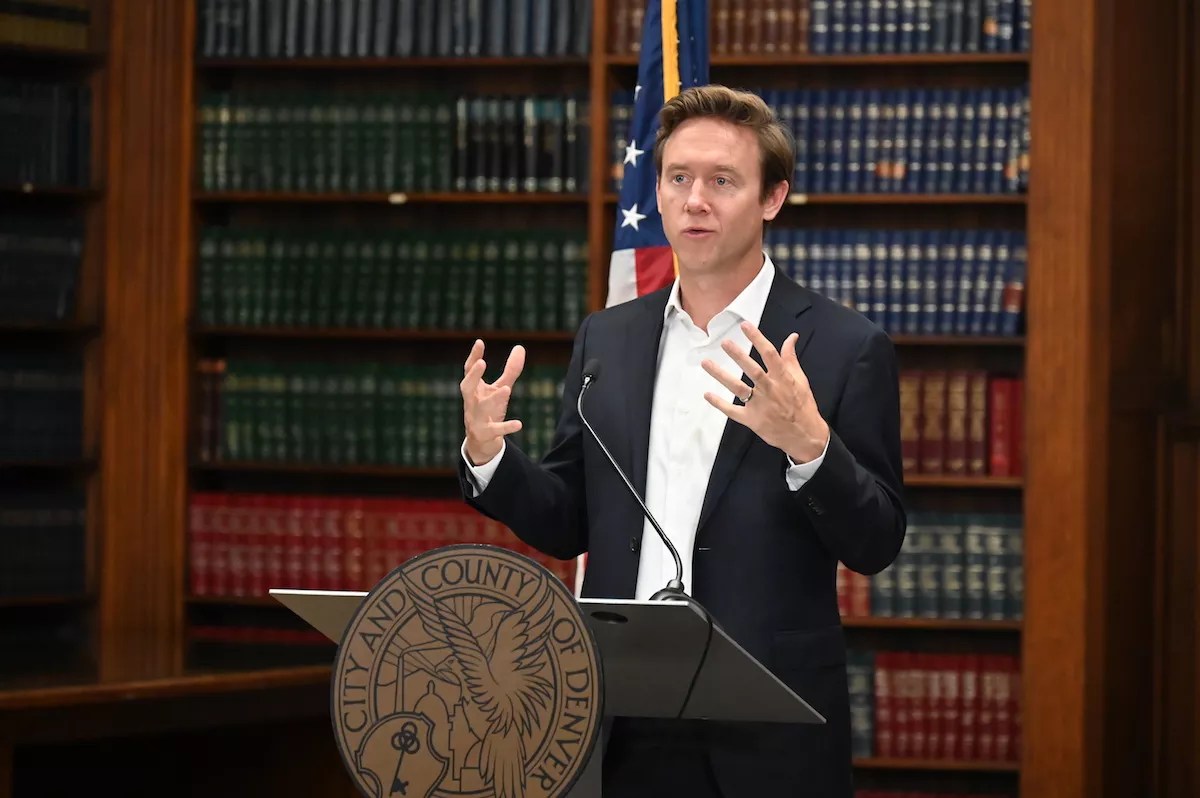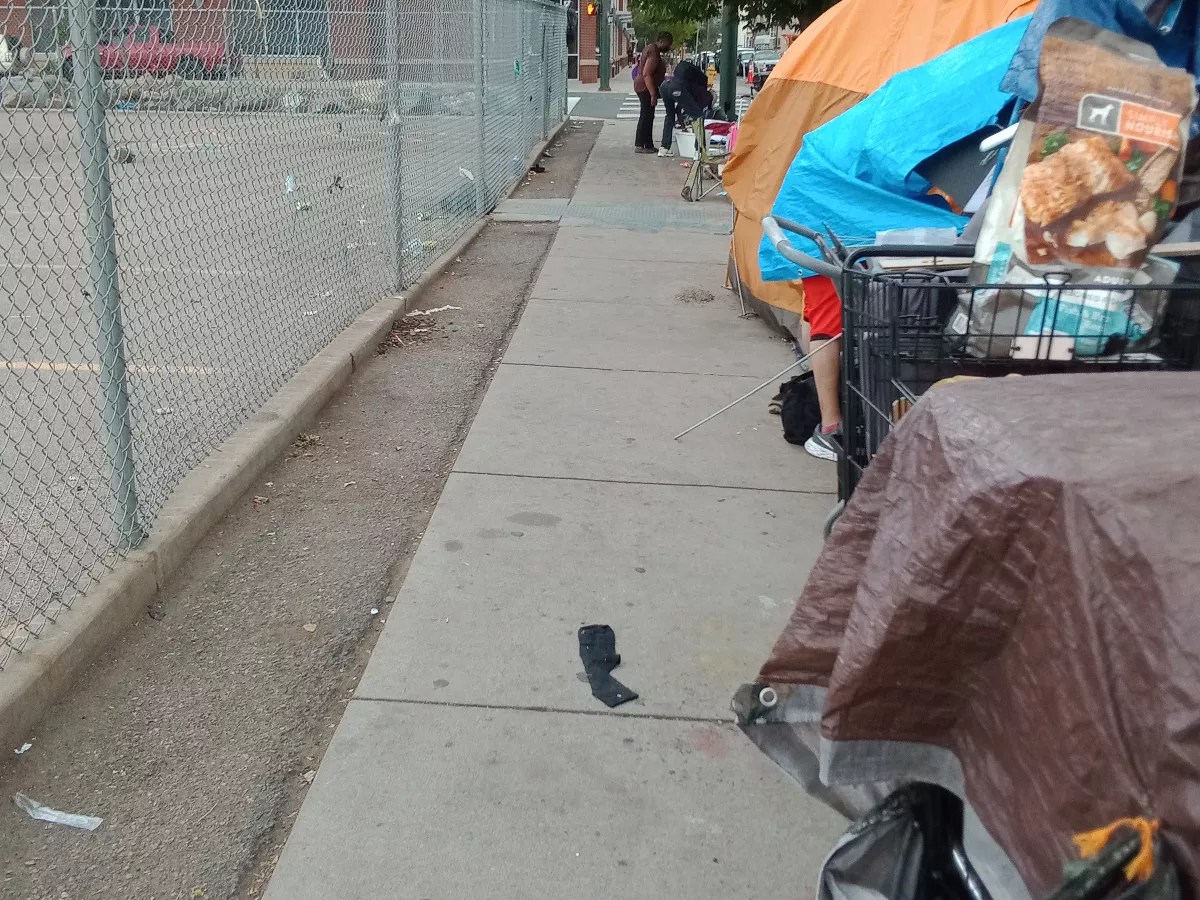
Bennito L. Kelty

Audio By Carbonatix
Mayor Mike Johnston has given the go-ahead for the first homeless encampment sweep under his new administration – slated to go down Friday, August 4, at 22nd and Stout streets – in response to reports of a rat infestation.
Johnston, who announced the sweep at a press conference on Wednesday, has teed it up as the first big step in his Homeless Resolution Initiative plan, which aims to house at least 1,000 people “living and dying on the streets of Denver” by the end of 2023.
There’s just one problem: Johnston doesn’t have anywhere to put anyone.
“This is the challenge of our current scenario, which is we don’t have the units up and ready for people to move to,” he told reporters. “We are in the unfortunate situation of having to move off the location where they are knowing they’re going to have to go someplace else.”
Denver’s new mayor confessed that his current approach to the city’s homeless crisis is not feasible, citing past encampment sweeps conducted by Mayor Michael Hancock that did nothing but force people to set up shop somewhere else.
“That, as a solution, doesn’t work because it just means you’re chasing people off one block and they end up on another block,” Johnston said. “That’s why our real intentional focus has been access to housing.”
The process of encampment sweeps is something Johnston has vowed to make more humane and effective. He said Wednesday that the city had approved the first one under his administration last week. The targeted encampment is home to around fifty to one hundred people, per estimates from the mayor and the Housekeys Action Network Denver, a nonprofit.
“This is a place where we have a significant rat infestation in the encampment,” Johnston said. “We’re very worried about the health and safety of the folks that are in that encampment as well the surrounding neighborhood.”
The Denver Housing Authority board of commissioners on July 28 approved the city’s $26 million purchase of the 194-unit Best Western Central Park hotel located at 4595 Quebec Street for permanent supportive housing – around the same time Johnston’s administration began outreach to the targeted encampment. However, that location apparently isn’t ready yet.
“After three weeks of not having posted sweeps since the new mayor came to office, he now plans to sweep the residents of the encampment at 22nd and Stout – in spite of not having housing for these people to move into,” says Housekeys Action Network Denver (HAND), an affordable-housing advocacy group.
Johnston said Wednesday that his administration considered other locations to sweep because of public health risks, but Stout was the first and only approved area.
“We have been focused really on places where we have significant public health risks,” he explained. “We know as we’re building that capacity, we have folks that are still living in conditions that can be unsafe. That’s why our position has changed to, if it is a public health and safety risk, then we want to make sure those people are protected from those public health and safety risks.”
In choosing which encampments to target, Johnston told reporters that he “looks at the totality of circumstances, which is how significant are the public safety risks? How significant are the impacts on either the public right-of-way or private property? And what is the impact on the displacement of the individuals in terms of their physical and mental health ability and access to services?”
Each encampment has “a different balance,” according to the mayor.
“We’ve had instances where we’ve had criminal activity that was taking place at encampments, but we determined that criminal activity was not from the residents of the encampments,” Johnston said. “We’re trying to balance the circumstances and make sure the benefit of public health and safety outweighs the impact of dislocation of people who are at risk.”

The homeless encampment at 22nd and Stout Street will be swept on Friday because of a rat infestation.
Courtest of HouseKeys Action Network Denver
The rat infestation at 22nd and Stout Street encampment was determined to be too great of a health risk for city officials to ignore, so nonprofit partners with the city started handing out fliers over the weekend in the area to give seven days’ notice of the sweep.
The Denver Department of Public Health & Environment has “declared it a public health risk referring to rodents living in the rocks in the encampment,” according to HAND. But it’s the city’s own fault, the group says.
“These rocks were placed along this street to try and keep houseless people off the block,” HAND says. “Now these very rocks are making the place a more friendly habitat for rodents. For the most part, residents of this encampment are keeping the area clean (despite not having trash service).”
Last week, Johnston promised that his administration would enforce the city’s camping ban “in a way that is respectful, dignified and that is thorough” – and in a way that prevents future encampments. He opted for the term “decommission” instead of sweep, since he plans to move people into housing immediately after being moved. But for right now, things will have to remain the same.
“Where there are instances of public health and safety risks, we think we owe it to residents living in those encampments in neighborhoods to make sure they’re not more at risk,” Johnston said Wednesday.
At a July 25 town hall, the mayor announced that his administration will continue to sweep for encampments that are on private property or pose public health risks – even as they continue to work finding housing to place people in.
“Sweeps will continue where there are public health risks” or “when there are camps in the public right-of-way…or if they’re on private property,” Johnston explained at the first of 78 town halls that will be held in every Denver neighborhood.
With the question of where people evicted from encampments will go looming large on Wednesday, Johnston insisted that his sweeps will not look like the ones carried out by the Michael Hancock administration before him.
“Our real focus is long-term about the housing,” he said. “There are downsides to moving encampments when you have people who we are having conversations with about access to housing identify places they might want to go, what their preferences are. The more we displace them, the more we have to then find them again and restart the conversation about what the housing options are. That kind of disruption is not always productive.”
Johnston expects things to change in the future as more housing options become available. But for now, all his administration can offer is services and promises of other long-term options down the road.

Mayor Mike Johnston has started his tour of town halls in Denver’s 78 neighborhoods to talk with residents about his plan to end homelessness.
Bennito L. Kelty
“What the options are that we have to offer people do not change until we have these housing options up and available,” he said. “It’s very hard when you’re moving people and you don’t have access to housing that will give them some place to go. That’s why our entire focus has been on actually the long-term path to get people to housing.”
Johnston’s team is currently “developing units that we can use to actually go to those people with a very different offer, which is, ‘Here are the units we can place you in.'” Although he has no place to put the people he’s sweeping off the curb, the mayor has faith in the city’s outreach efforts – which involve telling people at the 22nd and Stout encampment “about the opportunities for housing that will be coming through as part of our effort to get 1,000 people off the streets and into shelter.”
The city is also working to “mobilize faith communities around the city, their congregations. Sometimes their physical sites offer locations for housing.”
The 2022 Point-in-Time Count, a federally funded annual survey, found that a little over 1,300 people reported living on the streets of Denver last year. The 2023 count listed over 1,400 – an 8 percent increase.
The total number of homeless, including people in shelters, is now estimated to be more than 9,000.
Denver has partnered with Headwaters Protectors, a nonprofit co-founded by former mayoral candidate Ean Thomas Tafoya, to begin outreach to the people at the 22nd and Stout encampment, according to Johnston. The outreach was intended to not only warn people about the upcoming sweep, but to also “engage them in a conversation about what the long-term housing options are” via a letter and conversations “about the opportunities for housing that will be coming through as part of our effort to get 1,000 people off the streets and into shelter.”
The city’s Wellness Winnie, a mobile unit that offers physical and mental health checkups, will be stopping by on Friday to provide support. Johnston plans to be there as well.
“To talk to unhoused neighbors and answer questions,” he said Wednesday. “Make sure they have the protection and services we know that they may need.”